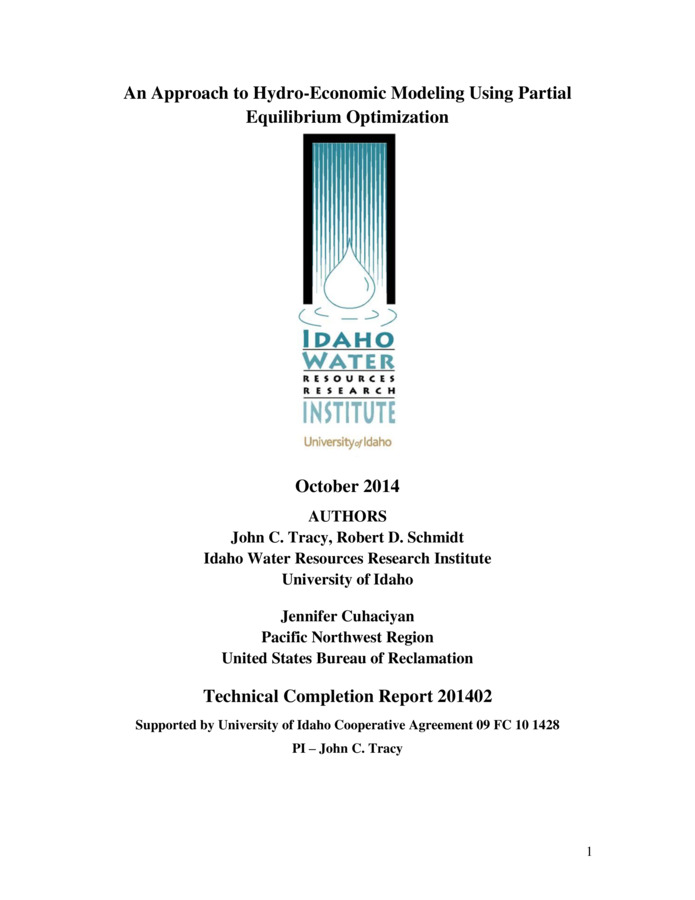PDF
An approach to hydro-economic modeling using partial equilibrium optimization. Technical completion report 201402 Item Info
- Title:
- An approach to hydro-economic modeling using partial equilibrium optimization. Technical completion report 201402
- Authors:
- Tracy, John C.; Schmidt, Robert D.; Cuhaciyan, Jennifer
- Contributors:
- United States Bureau of Reclamation
- Date:
- 2014-10-15
- Description:
- Conventional, economics-based water planning approaches often fail to adequately evaluate the economic efficacy of water projects by ignoring the dynamic relationship that exists between water supply and demand. More specifically, under the conventional approach to water management, which can be referred to as the supply management approach, the value of water is based upon the amount of compensation necessary to recover distribution costs (O&M, infrastructure, construction, etc.) with water demand forecasts assumed to be static and not affected by the cost of the supplied water. The demand management approach, on the other hand assumes that the costs associated with developing and delivering water supplies is invariant, and focuses on the value of water relative to the amount of water demand and controlling factors such as regulation, conservation, and availability of infrastructure. By ignoring how the demand for water changes as a result of changes in price and ignoring the change in cost associated with supplying greater amounts of water (referred to as the price/cost elasticity), both of these conventional approaches to water management fall short in their ability to adequately inform the development of effective water management strategies. Hydro-economic analysis presents an alternative to the Demand Management and Supply Management approaches. This type of analysis utilizes economic concepts to understand how the supply and demand for water are affected by changes in the cost of developing and delivering water supplies and how the demand for these water supplies is based on the value that can be derived from the water by the water users (ie crop value). This approach moves away from a static view with a fixed and invariant water demand, to a view where the demand for water is related to the economic concept of "value". Use of an economic approach in water management and planning, particularly under conditions where water is a scarce resource, enhances the ability to develop management alternatives that are based on an efficient and equitable use of water, thereby reducing wasteful practices at both the individual and institutional scale. Given that the value of water changes with both quantity and type of use, understanding the economic costs and benefits associated with meeting the demand for water resources allows for a more effective comparison of water management alternatives. Hydro-economic analysis provides a framework for incorporating multiple-, and often competing-, objectives (ie water supply, flood control, hydropower, recreation, ecosystem requirements, etc) into a single analysis. By translating the value of each objective (or hydro-service) into its respective economic benefit, hydro-economic analysis allows for a direct evaluation of the economic efficacy of competing water management alternatives. Such an approach allows for a more holistic evaluation of water resource management actions, resulting in the development of more effective and sustainable water management strategies, and in turn reducing the likelihood of undesirable outcomes or unsustainable plan.
- Subjects:
- model studies hydroeconomic modeling water supply water demand economic prediction henrys fork river boise river watershed boise river watershed
- Location:
- Boise Basin; Henrys Fork River
- Idaho County:
- Boise County
- Collection:
- IWRRI
- Series:
- IWRRI Technical Completion Report
- Source:
- Idaho Water Resources Research Institute, University of Idaho
- Identifier:
- IWRRI Number 201402
- Publisher:
- Idaho Water Resources Research Institute, University of Idaho
- Contributing Institution:
- University of Idaho
- Type:
- Text
- Format:
- application/pdf
- Cataloger:
- jh
- Date Digitized:
- 2014-11-12
- Language:
- eng
Source
- Preferred Citation:
- "An approach to hydro-economic modeling using partial equilibrium optimization. Technical completion report 201402", Idaho Waters Digital Library, University of Idaho Library Digital Collections, https://www.lib.uidaho.edu/digital/iwdl/items/iwdl-201402.html
Rights
- Rights:
- In copyright, educational use permitted. Educational use includes non-commercial reproduction of text and images in materials for teaching and research purposes. For other contexts beyond fair use, including digital reproduction, please contact the University of Idaho Library Special Collections and Archives Department at libspec@uidaho.edu. The University of Idaho Library is not liable for any violations of the law by users.
- Standardized Rights:
- http://rightsstatements.org/vocab/InC-EDU/1.0/

